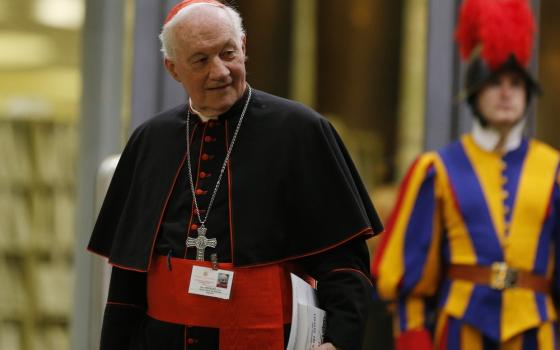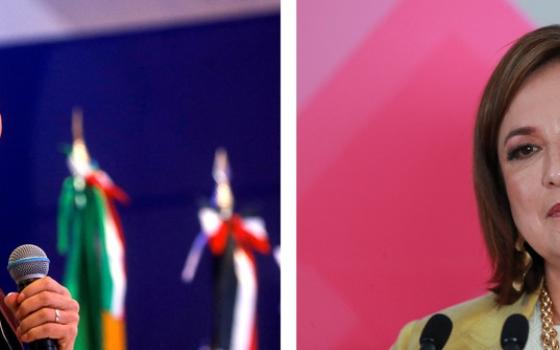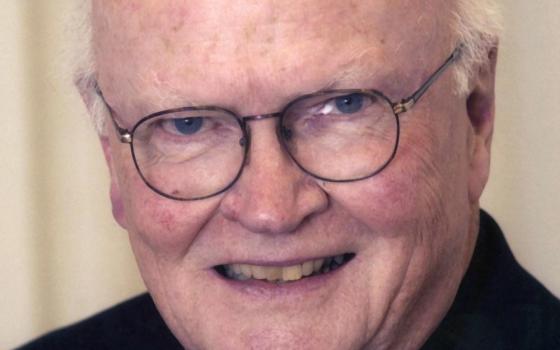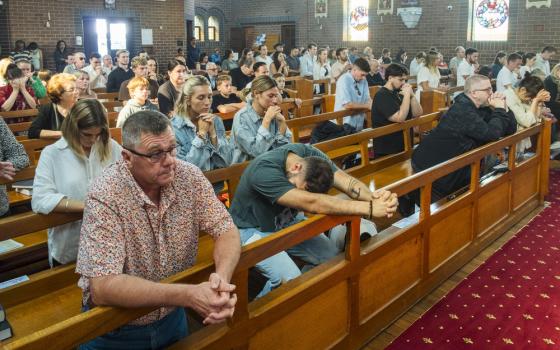Last night, I was in New York City to speak at an event sponsored by the Crossroads Cultural Center at New York University. The topic was the Holy Father’s address to the Bundestag, a text well worth considering. But, for me, as for the audience, the highlight of the evening was my fellow panelist, Msgr. Lorenzo Albacete.
I have always been abundantly blessed with friends and mentors. But, Msgr. Albacete is in a class by himself in terms of the impact he has had on my life. Some friends re-introduce you to a part of your life that you had set aside, distracted by other concerns, and in the re-introduction, you discover a long lost love, like the lost coins or the lost sheep in the parables. Some people introduce you to a friend who becomes an especially close friend, even after the person who first made the introductions takes a different path and falls out of one’s social circle. Some people, through the strength of their learning and intellectual capacity, open one’s mind to new avenues of thought. Others are examples of a special kind of holiness, a model if you will, of Christian discipleship. Msgr. Albacete’s impact has been felt in all these ways, all of them sources of grace to be sure, but each with a distinctive note.
Msgr. Albacete is Puerto Rican – which is why he was fifteen minutes late last night! He explained to me a long time ago that there are two types of time, Greenwich time and Caribbean time. Those who do not know this showed up fifteen minutes early for last night’s talk, like goyim at their first Bar Mitzvah. As a child, I had gone to Puerto Rico almost every year: My parents had lived there when they were first married and had brought me and my sister many times. In the 1980s, I had fallen out of the habit of going to that beautiful island. Not long after I met Msgr. Albacete in 1990, he was named President of the Catholic University in Puerto Rico in Ponce and in the years he served there, I visited five times. I do not go that many times anymore, but I have been there every year at least once since. It is not only the lush landscape, the endless beaches, the warm, humid air. It is not only the whole fried snapper and the mofungo and other delights of Puerto Rican cooking, delicious though they are. It is the people, the warmth of their human interactions, not just friendships, but even casual exchanges. You are never made to feel like a nuisance or a pest in Puerto Rico. When you are introduced to an individual, you will soon be introduced to their family. When you meet the family, you soon find yourself at a party and are treated as if you had always been there. To me, this is what a Catholic culture should look like.
Msgr. Albacete introduced me to many of the people I now consider dear friends. Of course, there are the good people of Communione e Liberazione, who have a charism for friendship. Last night, after the event, many of us went to a nice Italian restaurant in the Village. At one point, we were discussing the dangers of too much activity, of too much planning, the need for the Christian disciple to be, in a sense, not exactly passive before the world, but mindful that our human plans are never God’s plans. One young man said that, still, we must engage and try to evangelize. I replied that, yes, of course, we must try, but whether our efforts meet with success or come to naught, we should make sure we eat well and drink well and laugh well in the meantime, to make the time less mean. Sometimes, becoming a part of Lorenzo’s vast network of friends gets heady. I recall being in Rome for the consitory when Sean O’Malley was made a cardinal. A group of us went to lunch after the consistory in the morning. As lunch ended, I turned to an archbishop at the table, another friend I had met through Lorenzo, and said that I wanted to return to the Vatican when, on the afternoon of a consistory, the unwashed masses were permitted entrance to rooms in the Apostolic Palace normally closed to the public, to greet the new cardinals. I had never seen the Sala Regia and other glories of the Vatican. I said to the archbishop, “I am going to stick close to you so that we can hopefully get to the front of the line.” He said, “Don’t count on me. We will both stick close to Lorenzo and watch.” The check was paid, a car appeared outside the restaurant, we drove to a back entrance to the Vatican, around the back of St. Peter’s and were soon going up a back staircase, avoiding the enormously long line waiting to enter via the Porto di Bronzo, and getting into the majestic rooms even before the cardinals arrived.
Msgr. Albacete’s mind is fascinating. There are not many priests who could disarm Christopher Hitchens as Albacete did. He inhales literature and can speak on a wide variety of topics. Before entering the seminary, he was a nuclear physicist and likes to joke, “Remember, I am a rocket scientist.” But, his great gift to me was not only that he opened intellectual doors I never knew existed. Nor, that he opened my heart to spiritual insights I never knew existed. No, his great gift was to make me see that intellectual doors are spiritual doors, and spiritual doors are intellectual doors, and that our cultural crisis is a crisis of reason as much as it is a crisis of faith, that education is primarily a matter of the heart, and the life of the mind must learn to listen to that heart. Last night, in his talk, Msgr. Albacete focused on the “listening heart” for which Solomon asked in the Hebrew Scriptures, which was such a central motif in the Holy Father’s Bundestag speech, and said that freedom, real freedom, is found only when our hearts, our minds and our nature are in harmony, and we can only achieve such freedom if we learn to listen.
Msgr. Albacete has not had what one would call an easy life. I have seen his suffering. That, too, seems to be an essential ingredient in holiness. His holiness is not the kind we Catholics in the U.S. usually consider: It has nothing to do with Puritanism or the Irish Jansenism that has so afflicted the Catholic Church in the U.S. It permits cigarettes and good wine. It is not especially pious, better to say not conventionally pious. No, his holiness resides in the ability to sustain the sure hope in the resurrection, in the face of one’s own sins and shortcomings. It is the opposite, and the enemy of despair. It is the secret of Albacete’s ability to connect with young people and with non-religious people, this hope that does not deny our less than noble desires, nor minimize their influence and attractions. I remember being in an RCIA session once, and the presenter was droning on about why we sin, because we deviate from the natural law, blah, blah, blah. I finally could bear it no longer and said something I never would have understood but for Albacete: “I don’t know about anybody else, but I sin because it’s fun.”
They were having trouble with the video last night, but if it came out alright, I will post it later, so you can all see Msgr. Albacete in action. You can google other videos he has done over the years. I was not only honored to share the stage with him, I was refreshed in my faith and delighted again by his company and encouraged by his insights. It was heaven to laugh with him again. Then we went outside and smoked a cigarette.




